





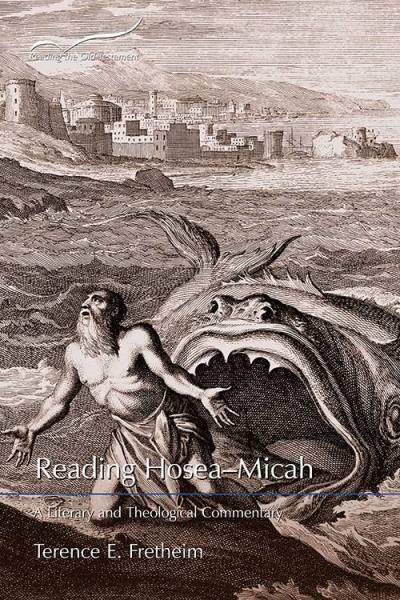
In this volume in the Reading the Old Testament commentary series, Terence E. Fretheim explores themes of indictment, judgment, and salvation in Hosea–Micah. The indictment against the people of God especially involves issues of idolatry, as well as abuse of the poor and needy. The effects of such behaviors are often horrendous in their severity. While God is often the subject of such judgments, the consequences, like fruit, grow out of the deed itself. Issues of indictment and judgment are not finally ends in themselves, but in the service of the salvation of God.
Review
"The Smyth & Helwys series is a perfect venue for Fretheim’s interpretive skills. He is among the best readers of texts now at work, and here his consummate skill is everywhere evident. In addition to the nuts and bolts of historical criticism that he handles succinctly, he moves readily into the rhetorical strategies performed in the text and finally to his forte of theological interpretation. His exposition is a welcome and reliable probe of difficult texts that continue, he makes clear, to insist upon their own compelling contemporaneity." — Walter Brueggemann, Columbia Theological Seminary
Terence E. Fretheim is Elva B. Lovell Professor of Old Testament Emeritus at Luther Seminary in St. Paul, Minnesota. He graduated from Luther College (BA, 1956), Luther Theological Seminary (BD, 1960), and Princeton Theological Seminary (PhD, 1967). He has taught at Augsburg College and Theological Seminary (1961–1963, 1967–1968) and Luther Seminary (1968–2013). Through the years he has taught for shorter periods of time at several theological schools in the US and also abroad (Malaysia; Hong Kong; Cairo). He has been a speaker at numerous church gatherings across the country. He is the author of 23 books, including Jeremiah in the Smyth & Helwys Bible Commentary Series.
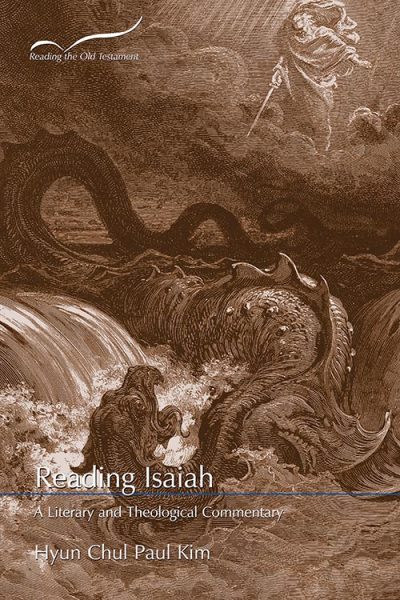
In this commentary, Hyun Chul Paul Kim brings together innovative interpretive approaches and the proposals of various scholars to interpret the book of Isaiah in light of the ancient literature/culture, intertextual allusions/correlations, and socio-historical contexts of the empires. While closely exegeting key issues of each chapter, the commentary also explores interpretive relevance and significance between ancient texts and the modern world. Engaging with theological messages of the book of Isaiah as a unified whole, the commentary will both illuminate and inspire readers to wrestle with its theological implications for today’s church and society.
Review
"Hyun Chul Paul Kim presents a compelling commentary on the book of Isaiah, a book that would be considered politically incorrect in our contemporary world. He deftly combines the details of a diachronic, or historical, analysis of the various elements of the book with an overarching synchronic, or literary, perspective that unites the book as a whole. His work is fundamentally intertextual in that it explores the relationships between Isaiah and ancient and contemporary worlds. This accessible commentary will both prompt and enable students to engage this endlessly fascinating book. — Marvin A. Sweeney, Professor of Hebrew Bible, Claremont School of Theology, Claremont, California, Professor of Tanak, Academy for Jewish Religion California, Los Angeles, California
Hyun Chul Paul Kim is the Harold B. Williams Professor of Hebrew Bible at Methodist Theological School in Ohio. He is the co-author of You Are My People: An Introduction to Prophetic Literature and co-editor of The Desert Will Bloom: Poetic Visions in Isaiah, Formation and Intertextuality in Isaiah 24–27, and Concerning the Nations: Essays on the Oracles against the Nations in Isaiah, Jeremiah and Ezekiel. A former co-chair of the Formation of the Book of Isaiah group at SBL and a recent Fulbright U.S. Scholar to Korea, he is currently a co-chair of the Intertextuality and the Hebrew Bible consultation at SBL.
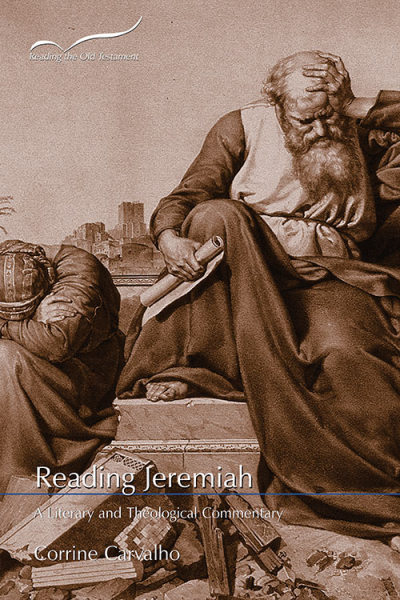
In this new volume from the Reading the Old Testament commentary series, biblical scholar Corrine Carvalho explores the book of Jeremiah—where books are burned in the palace and the temple is a jail. Reflecting the ways that communal tragedy permeates communal identity, the book of Jeremiah as literary text embodies the confusion, disorientation, and search for meaning that all such tragedy elicits. Just as the fall of Jerusalem fractured the Judean community and undercut every foundation on which it built its identity, so too the book itself (or more properly, the scroll) jumbles images, genres, and perspectives.
Carvalho’s study of the book of Jeremiah engages the text as a collection of literature. To be sure, some of this literature has roots in oral performance, but it comes down to us as a written text. It is a complex collection, however, with little inherent cohesion. In fact, it has been preserved in two different arrangements, one found in the Hebrew version and the other in the Greek. Both versions presume that the audience hears this material against a particular historical backdrop. This book fleshes out Jeremiah’s historical horizon, but it does so in order to clarify the literature rather than as an end in itself.
Corrine Carvalho is a professor in the theology department at the University of St. Thomas in St. Paul, Minnesota. In 1991, she earned her PhD from Yale, where she specialized in the Hebrew Bible and Old Testament studies. She also has a MA in Old Testament from the Graduate Theological Union in Berkeley, California, and a BA in Latin from the University of San Francisco, where she graduated magna cum laude.
Edited by Mark E. Biddle, Russell T. Cherry Professor of Hebrew Bible/Old Testament at Baptist Theological Seminary at Richmond, the Reading the Old Testament commentary series presents cutting-edge biblical research in accessible language.
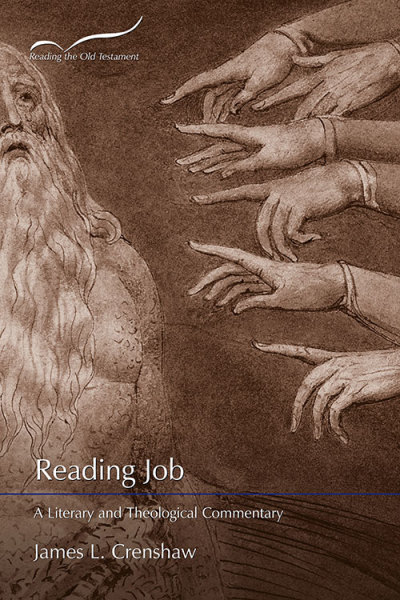
At issue in the Book of Job is a question with which most all of us struggle at some point in life, “Why do bad things happen to good people?” James Crenshaw has devoted his life to studying the disturbing matter of theodicy—divine justice—that troubles many people of faith. Few individuals come from reading Job unmoved. If they seek answers, they likely will be disappointed. And, many find the depiction of God troubling. If God were merely to meet our expectations, the Creator would hardly be anything more than our own projections into the heavens. Perhaps the ancient poet serves readers best by starkly portraying the brutal reality that life and this world are not fair, and that justice is a human project.
Reviews
"Crenshaw's study of Job is rich in insight and a brilliant contribution to scholarship. As a renown scholar in the interpretation of wisdom texts, this volume should be found on the bookshelves of every biblical scholar who is interested in wisdom literature and the interpretation of Job." — Leo G. Perdue, Brite Divinity School
"Excellent commentaries on Job abound; Jim Crenshaw’s 'reading' of Job adds to the list and raises the bar. If contemporary readers wish to enter fully into Job’s world, his irreparable losses, his relentless questions about the moral order of the universe God has created, they can find no better guide for the journey than a commentator whose expertise, artfulness, and eloquence are acutely attuned to the admonitions of Shakespeare’s King Lear: 'If thou wilt weep my fortunes, take my eyes.' Crenshaw has read, felt, and immersed himself in Job’s fortunes with eyes and heart chastened by a world overfull with inexplicable suffering that continues to claw at the heavens – Joban-like – for justice." — Samuel E. Balentine, Professor of Old Testament, Union Presbyterian Seminary, Richmond, VA.
"James Crenshaw is the preeminent interpreter of biblical wisdom in this generation. His work is distinguished by his deep existential concern, especially on the subject of theodicy, which is at the heart of the book of Job. This is a work not only of exegesis, but of biblical theology in the best sense." — John J. Collins, Holmes Professor of Old Testament, Yale University
"James Crenshaw, one of the foremost scholars of wisdom literature, brings over forty years of scholarship and teaching to bear on his reading of the book of Job. Respected not only for the breadth of his knowledge but also for the passion with which he explores difficult theological questions of human suffering and divine justice, Crenshaw has written a commentary marked not only by careful exegesis but also by deep insight into the many perennial issues raised by the book of Job." — Carol A. Newsom, Charles Howard Candler Professor of Old Testament, Candler School of Theology, Emory University
James L. Crenshaw is Robert L. Flowers Professor Emeritus of Old Testament at Duke University. Widely published, he is one of the world’s leading scholars on Old Testament study, focusing especially on wisdom and poetry.
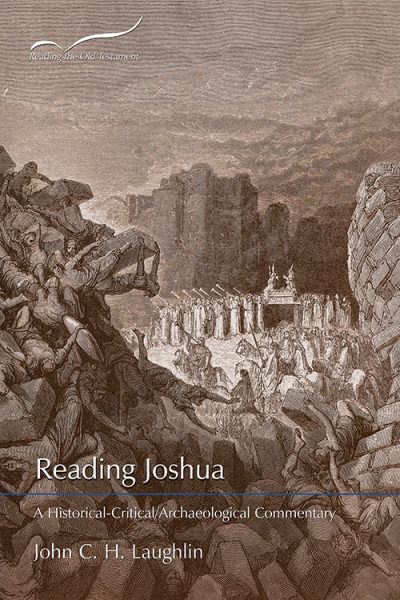
Reading Joshua was written for anyone who wishes to engage critically one of the most, if not the most, problematic and troublesome books in the Bible. Using the best of current historical-critical studies by mainstream biblical scholars, and the most recent archaeological discoveries and theorizing, Laughlin questions both the historicity of the stories presented in the book as well as the basic theological ideology presented through these stories: namely that Yahweh ordered the indiscriminate butchery of the Canaanites. This ideology is criticized for what it is: a xenophobic and genocidal approach to the issue of how human beings should act toward one another in a multi-cultural world. Read against the backdrop of the Babylonian Exile (sixth century BCE), these stories may have served well the purpose(s) of their author(s). Thus these troubling accounts may have had their time and place, but that time and place is not the twenty-first-century world in which we now find ourselves.
Reviews
"Authentic native of the Bible Belt, fully conversant with mainstream biblical scholarship, and experienced archaeologist, John Laughlin offers a new translation and refreshing no-nonsense commentary on one of the most troubling books of the Bible. He pulls no punches. For starters, he conveys and confirms the thinking of both mainstream biblical scholars and Palestinian archaeologists that the Joshua story of how the Israelites conquered Canaan and purged the land of its native population never really happened. And the really troubling thing for him is that the writers of Joshua 'have their god not only approving such actions but also ordering them in the first place.' - J. Maxwell Miller, Professor Emeritus, Emory University
"Laughlin has produced an unflinching critical commentary on the book of Joshua, basing his analysis on extensive research into the latest and best archaeological evidence. By adding a touch of 'moderate' postmodernism, he provides an analysis that places this book into its own historical and ideological context—without preconceived religious notions of what Joshua is 'supposed to say.' Laughlin gives us not only a critical commentary on the text, but also a critical commentary on the ideology that created the text. - Jeffrey A. Fager, Professor of Religion and Philosophy (ret.)
John C. H. Laughlin is Professor Emeritus of Religion at Averett University in Danville, Virginia. He earned a BA from Wake Forest and MDiv and PhD from the Southern Baptist Theological Seminary. A teacher for more than forty years, Laughlin specializes in the Jewish Scriptures, archaeology, and philosophy. He has served as a field supervisor for many seasons of archaeological field work in Israel, including at Tel Dan, Capernaum, Banias (Caesarea Philippi), and Kursi. He is the author of numerous articles and book reviews, and his own books include Archaeology and the Bible and Fifty Major Cities in the Bible.
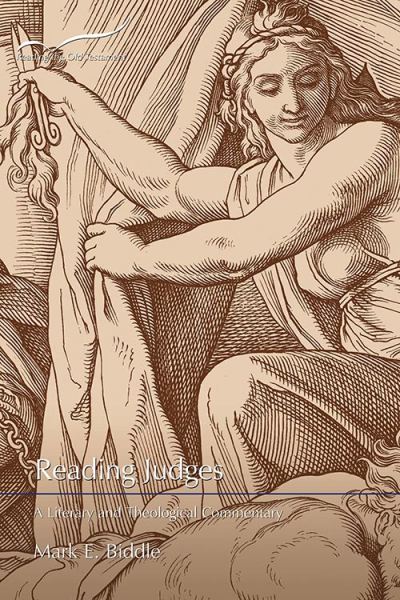
Reading the Old Testament book of Judges presents a number of significant challenges related to social contexts, historical settings, and literary characteristics. Acknowledging and examining these difficulties provides a point of entry into the world of Judges and promises to enrich the reading experience.
How should we read the book of Judges? For several decades, biblical scholars have been debating the merits of two contrasting approaches to biblical interpretation: a synchronic approach, which attempts to see the text as a whole, as opposed to a diachronic approach, which asks questions about history and development of the text.
This commentary draws on historical-critical methods to shed light on this historic period and the role of Judges in Israel’s history. At the same time, Mark Biddle acknowledges that the relevance for modern reader lies in the text as a whole and not in the details of its developmental history.
Biddle tackles the kinds of issues (violence, patriarchy, tribalism) that may inhibit our ability to receive this text as inspired Scripture. This volume makes clear that the power of this biblical narrative derives in large part from its unvarnished portrayals of human foibles and failures—and of God’s steadfast commitment to relationship with humankind nonetheless.
Mark E. Biddle holds degrees from Samford University, the Southern Baptist Theological Seminary, Rueschlikon Baptist Theological Seminary, and the University of Zurich. In addition to editing the Reading the Old Testament series, he is the author of Deuteronomy in the Smyth & Helwys Bible Commentary series.
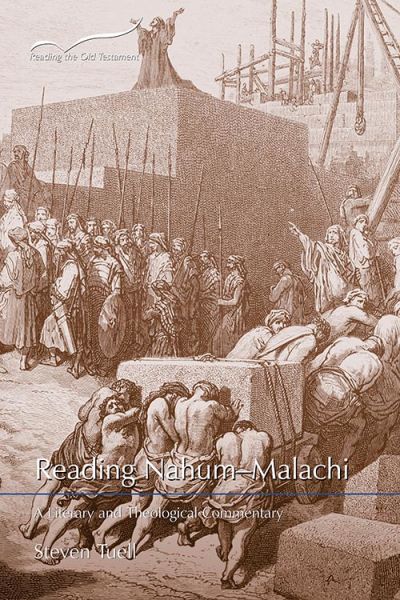
Nahum–Malachi, the last six books of the Christian Old Testament, span the period from the end of the Assyrian empire in the 7th century BCE to the fall of the Neo-Babylonian Empire and the emergence of Persia in the 5th century BCE. But these books also have a collective identity as the latter half of the Book of the Twelve-the ancient Jewish and Christian designation for the so-called "minor" prophets. This commentary maintains a balance between reading each of these six books in its own historical and social setting and considering the interrelationships and canonical functions of these books within the Book of the Twelve as a whole. Jesus ben Sirach wrote that "the Twelve Prophets...comforted the people of Jacob and delivered them with confident hope" (Sir 49:10). This commentary, following ben Sirach, proposes that the theme of the Book of the Twelve is a comforting word of hope and deliverance.
Reviews
"Steven Tuell has written a lucid, concise, and informative commentary on the last six books of the Book of the Twelve Prophets. His commentary addresses historical, compositional, and theological issues in a manner that will be especially accessible for undergraduate and seminary students in Christian colleges, universities, and theological seminaries." — Marvin A. Sweeney, Claremont School of Theology and Academy for Jewish Religion
"Steven Tuell has addressed his considerable skill as a good reader of texts to the much neglected six “minor” prophets who close the Christian Old Testament. By his alert, steady attentiveness he shows why these neglected books merit attention, and why the neglect of them is a misfortune. Tuell’s reading is fresh, reliable, and suggestive. His commentary will be, in time to come, a substantial reference point for our continuing work and study." — Walter Brueggemann, Columbia Theological Seminary
"With admirable clarity and characteristically well-informed insight, Steven Tuell’s exegesis engages the historical particularity of the final six witnesses collected into the prophetical “Book of the Twelve.” Citing Sirach 49:10 as his mandate, he is also keenly attentive to the ways these individual voices contribute to the theological vitality of the book as a whole. In short, readers will appreciate that he achieves the balance he sets as his interpretative goal." — S. Dean McBride, Jr. Professor Emeritus of Biblical Hebrew and Old Testament Interpretation, Union Presbyterian Seminary Richmond, Virginia
"This well-written book by a leading scholar in prophetic literature is a welcome addition to the literature on the minor prophets. Both graduate students and pastors, especially, will appreciate the erudite discussions of issues of trans- mission, translation, and structure, coupled with a keen theological sense of how these texts speak to the world today." — Corrine Carvalho, Professor of Theology University of St. Thomas
Steven Tuell is the James A. Kelso Professor of Hebrew and Old Testament at Pittsburgh Theological Seminary, where he has taught since 2005. His research interests are biblical prophecy, particularly the book of Ezekiel and the Book of the Twelve, and the biblical literature of the early Persian Period. An ordained elder in The United Methodist Church, Tuell has served churches in Pennsylvania, New Jersey, West Virginia, and Virginia. He and his wife, Wendy, have three adult sons.
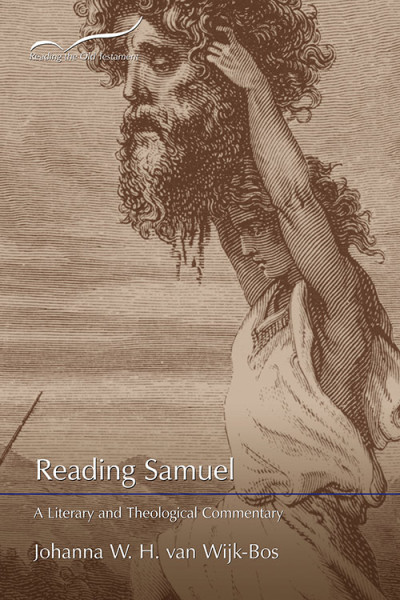
Interpreted masterfully by pre-eminent Old Testament scholar Johanna W. H. van Wijk-Bos, the story of Samuel touches on a vast array of subjects that comprise the rich fabric of human life. As it happens, in this volume we view ancient Israel in the era of Samuel, Saul and David. From parental yearning for their young to spousal and sibling relationships, these accounts entail far more than simply a recounting of the central characters lives and circumstances. The reader gains an inside look at royal intrigue, military campaigns, occult practices and the significance of religious objects of veneration.
Reviews
"Johanna W. H. van Wijk-Bos’ new commentary on 1-2 Samuel is elegantly written with the sensibility of a seasoned Old Testament scholar and the heart of a minister. She is sensitive to the theological and ethical issues regarding leadership raised by this sometimes difficult text and she also reflects on the women’s roles as few authors of commentaries have done before. This new volume in the Smyth & Helwys Reading the Old Testament series will be most helpful for preachers and teachers seeking a fresh word on familiar stories." — Alice Ogden Bellis, Professor of Old Testament Language & Literature, Howard University Divinity School, Washington, DC.
"The stories in 1 and 2 Samuel may seem an easy read, some of the easiest in the Bible. Johanna van Wijk-Bos leads us to read them slowly, notice the way the stories are told and the subtleties of their telling, and thus helps us derive much more from them than we might otherwise have gained. She helps us understand the dynamics of the stories and ponder the questions each one raises. Like the biblical books on which she comments on, her book invites and rewards careful, attentive reading." — John Goldingay, Professor of Old Testament, Fuller Theological Seminary, Pasadena, CA
"At times biblical commentators tend either to paraphrase the biblical text more or less or almost to lose themselves in technical details. In her fine commentary on the two books of Samuel, Johanna van Wijk-Bos elegantly avoids both these pitfalls. In this meticulously researched book, she is constantly in dialogue with other scholars. She skillfully informs the readers about the significance of many of the Hebrew words for places and people, without losing herself in details. Arguably, one of the most important challenges for contemporary biblical commentaries is to what extent they take gender studies into account. Unsurprisingly, the two books of Samuel provide van Wijk-Bos with ample possibilities to discuss various aspects of gender issues, and she does it succinctly and sophisticatedly. This is a rich and thought-provoking commentary, allowing the narrative to speak for itself." — Jesper Svartvik, Professor of Theology of Religions, Lund University, Lund, Sweden and the Swedish Theological Institute, Jerusalem
Johanna W. H. van Wijk-Bos is the Dora Pierce Professor of Bible and Professor of Old Testament at Louisville Presbyterian Theological Seminary. She holds degrees from Leiden University, The Netherlands (M.Div., M.Phil.) and Union Theological Seminary, New York (M.Phil, Ph.D.). Dr. Bos is an ordained minister in the Presbyterian Church (U.S.A.) and engages herself with issues of justice for women and disadvantaged groups locally and in the global arena. A pioneering woman in theological teaching, she was the only woman in 1976 to receive a doctorate from Union Theological Seminary in New York and the first woman to receive academic tenure at Louisville Seminary.
Edited by Mark E. Biddle, Russell T. Cherry Professor of Hebrew Bible/Old Testament at Baptist Theological Seminary at Richmond, the Reading the Old Testament commentary series presents cutting-edge biblical research in accessible language.
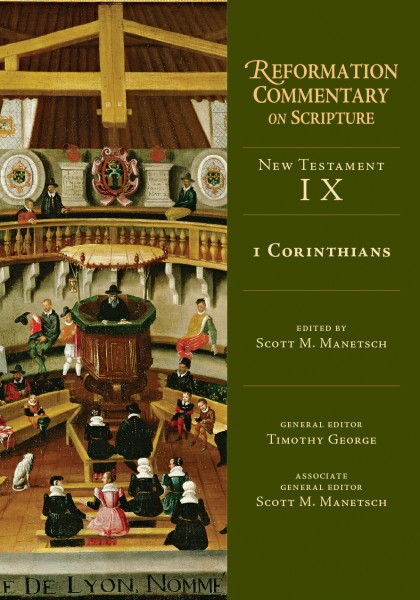
In his first letter to the church in Corinth, Paul writes, "I delivered to you as of first importance what I also received: that Christ died for our sins in accordance with the Scriptures, that he was buried, that he was raised on the third day in accordance with the Scriptures" (1 Cor 15:3-4 ESV).
Reflecting on Paul's summary of the gospel, sixteenth-century biblical commentator, theologian, and Lutheran pastor Tilemann Hesshus wrote, "The central tenet and foundation of our entire religion is that our Lord Jesus Christ died for our sins and rose again for our justification. All of our comfort, salvation and hope rest upon this foundation. From this is derived that greatest comfort concerning the resurrection of the dead and the future life of eternal glory."
Throughout the church's history, Christians have turned to the epistles of the Apostle Paul in order to understand the essentials of the Christian faith, learn from the challenges faced by early Christians, and discern how to navigate the complexities of following Christ. Among those who gained wisdom from Paul were the Protestant Reformers, who found inspiration and instruction about how to lead the church of their day during a time of significant theological debate, ecclesiastical reform, and spiritual renewal.
In this volume of the Reformation Commentary on Scripture, Scott Manetsch guides readers through a diversity of Reformation-era commentary on the first of Paul's letters to the Corinthians. Within this volume, readers will encounter familiar voices and discover lesser-known figures from a variety of theological traditions, including Lutherans, Reformed, Radicals, Anglicans, and Roman Catholics. Drawing on a variety of resources—including commentaries, sermons, treatises, and confessions—much of which appears here for the first time in English, it provides resources for contemporary preachers, enables scholars to better understand the depth and breadth of Reformation commentary, and helps all Christians cling to the things of first importance.
The Reformation Commentary on Scripture Series
The Reformation Commentary on Scripture (RCS) provides a crucial link between the contemporary church and the great cloud of witnesses that is the historical church. The biblical insights and rhetorical power of the tradition of the Reformation are here made available as a powerful tool for the church of the twenty-first century. Like never before, believers can feel they are a part of a genuine tradition of renewal as they faithfully approach the Scriptures.
In each RCS volume you will find the biblical text in English, from the English Standard Version (ESV), alongside the insights of the leaders of the Reformation. Hear from landmark figures such as Luther and Calvin, as well as lesser-known commentators such as Peter Martyr Vermigli, Johannes Oecolampadius, Martin Bucer, Johannes Brenz, Caspar Cruciger, Giovanni Diodati, and Kaspar Olevianus. The series introduces you to the great diversity that constituted the Reformation, with commentary from Lutheran, Reformed, Anglican, Anabaptist and even reform-minded Catholic thinkers, who all shared a commitment to the faithful exposition of Scripture.
Each volume is designed to facilitate a rich research experience for preachers and teachers, and contains a unique introduction written by the volume editor, providing a reliable guide to the history of the period, the unique reception of the canon of Scripture and an orientation to the thinkers featured in the volume. Many of these texts are being published in English for the first time, and volumes also contain biographies of figures from the Reformation era, adding an essential reference for students of church history.
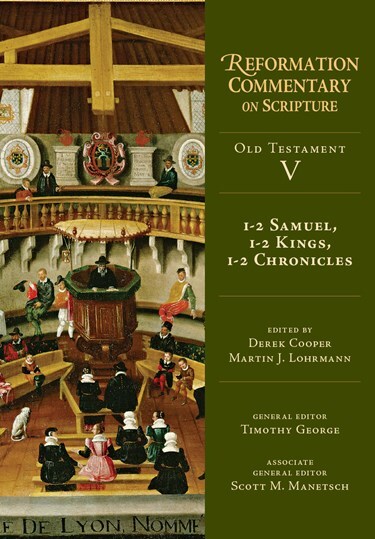
'Then David said to the Philistine, 'You come to me with a sword and with a spear and with a javelin, but I come to you in the name of the LORD of hosts.'' (1 Samuel 17:45)
Reflecting upon David's victory over Goliath, Reformation translator, theologian and commentator William Tyndale compared it to Christ's victory over sin and death: 'When David had killed Goliath the giant, glad tidings came to the Israelites that their fearful and cruel enemy was dead and that they were delivered out of all danger. For this gladness, they sang, danced and were joyful. In like manner, the good news or 'gospel' of God is joyful tidings.'
The books of 1-2 Samuel, 1-2 Kings and 1-2 Chronicles, which record the history of Israel from the prophetic ministry of Samuel to the fall of Jerusalem, provided the reformers with some of the best-known narratives of the Old Testament upon which to comment, including Hannah's prayer, the anointing of Saul as Israel's first king, David's triumph over Goliath and his later adultery with Bathsheba, Solomon's building of the Temple, Elijah's challenge to the prophets of Baal, and the healing of Naaman.
For the reformers, these stories were not merely ancient Israelite history, but they also foreshadowed the coming of Jesus Christ, and they had immediate relevance for their lives and the church of their day. Thus, Anglican exegete John Mayer perceived within King Josiah's reform of Israelite worship after the discovery of the Book of the Law a prefiguration of 'what should be done in the latter days of the gospel, in which a greater reformation of the religion is now being made.'
In this Reformation Commentary on Scripture volume, Derek Cooper and Martin Lohrmann guide readers through a diversity of Reformation commentary on these historical books. Here, readers will find reflections from both well-known voices and lesser-known figures from a variety of confessional traditions—Lutherans, Reformed, Radicals, Anglicans and Roman Catholics—many of which appear in English for the first time. By drawing upon a variety of resources—including commentaries, sermons, treatises and confessions—this volume will enable scholars and students to understand better the depth and breadth of Reformation-era insights on Scripture. It will also provide resources for contemporary preachers, and encourage all those who continually seek to share the 'joyful tidings' of Jesus Christ.
The Reformation Commentary on Scripture Series
The Reformation Commentary on Scripture (RCS) provides a crucial link between the contemporary church and the great cloud of witnesses that is the historical church. The biblical insights and rhetorical power of the tradition of the Reformation are here made available as a powerful tool for the church of the twenty-first century. Like never before, believers can feel they are a part of a genuine tradition of renewal as they faithfully approach the Scriptures.
In each RCS volume you will find the biblical text in English, from the English Standard Version (ESV), alongside the insights of the leaders of the Reformation. Hear from landmark figures such as Luther and Calvin, as well as lesser-known commentators such as Peter Martyr Vermigli, Johannes Oecolampadius, Martin Bucer, Johannes Brenz, Caspar Cruciger, Giovanni Diodati, and Kaspar Olevianus. The series introduces you to the great diversity that constituted the Reformation, with commentary from Lutheran, Reformed, Anglican, Anabaptist and even reform-minded Catholic thinkers, who all shared a commitment to the faithful exposition of Scripture.
Each volume is designed to facilitate a rich research experience for preachers and teachers, and contains a unique introduction written by the volume editor, providing a reliable guide to the history of the period, the unique reception of the canon of Scripture and an orientation to the thinkers featured in the volume. Many of these texts are being published in English for the first time, and volumes also contain biographies of figures from the Reformation era, adding an essential reference for students of church history.
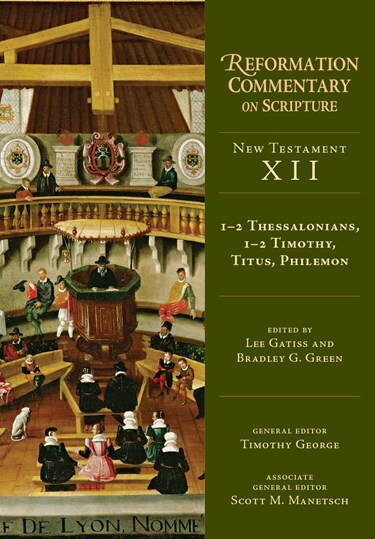
"Since we believe that Jesus died and rose again, even so, through Jesus, God will bring with him those who have fallen asleep." (1 Thess 4:14).
The epistles of the New Testament provide unparalleled insight into the realities of the life of the early church, guidance for those called to lead the church, and comfort in the face of pressing theological questions. Among those letters are 1 and 2 Thessalonians, which address questions about the expected return of Christ, the pastoral epistles of 1 and 2 Timothy and Titus, written to two of Paul's coworkers who were overseeing early churches, and Philemon, which concerns the relationship between a slave and his master.
The Protestant Reformers of the sixteenth century also found wisdom and guidance in these letters. For example, Martin Luther reminded the Christians of his day that Paul had encouraged believers "not to sorrow over the dead as others who have no hope, but to comfort each other with God's Word as having a certain hope of life and of the resurrection of the dead."
In this volume of the Reformation Commentary on Scripture, Lee Gatiss and Bradley Green guide readers through a diversity of early modern commentary on the epistles of 1 and 2 Thessalonians, 1 and 2 Timothy, Titus, and Philemon. Readers will hear from familiar voices and discover lesser-known figures from a variety of theological traditions, including Lutherans, Reformed, Radicals, Anglicans, and Roman Catholics. Drawing upon a variety of resources—including commentaries, sermons, treatises, and confessions—much of which appears here for the first time in English, this volume provides resources for contemporary preachers, enables scholars to better understand the depth and breadth of Reformation commentary, and seeks to bring guidance and comfort in the midst of today's challenges.
The Reformation Commentary on Scripture Series
The Reformation Commentary on Scripture (RCS) provides a crucial link between the contemporary church and the great cloud of witnesses that is the historical church. The biblical insights and rhetorical power of the tradition of the Reformation are here made available as a powerful tool for the church of the twenty-first century. Like never before, believers can feel they are a part of a genuine tradition of renewal as they faithfully approach the Scriptures.
In each RCS volume you will find the biblical text in English, from the English Standard Version (ESV), alongside the insights of the leaders of the Reformation. Hear from landmark figures such as Luther and Calvin, as well as lesser-known commentators such as Peter Martyr Vermigli, Johannes Oecolampadius, Martin Bucer, Johannes Brenz, Caspar Cruciger, Giovanni Diodati, and Kaspar Olevianus. The series introduces you to the great diversity that constituted the Reformation, with commentary from Lutheran, Reformed, Anglican, Anabaptist and even reform-minded Catholic thinkers, who all shared a commitment to the faithful exposition of Scripture.
Each volume is designed to facilitate a rich research experience for preachers and teachers, and contains a unique introduction written by the volume editor, providing a reliable guide to the history of the period, the unique reception of the canon of Scripture and an orientation to the thinkers featured in the volume. Many of these texts are being published in English for the first time, and volumes also contain biographies of figures from the Reformation era, adding an essential reference for students of church history.
Lee Gatiss (PhD, Cambridge) is the director of Church Society and a lecturer in church history at Union School of Theology. He is the author of several books, including Light After Darkness: How the Reformers Regained, Retold, and Relied On the Gospel of Grace and Cornerstones of Salvation: Foundations and Debates in the Reformed Tradition. He is also the editor of The NIV Proclamation Bible, The Sermons of George Whitefield, and a number of books on Puritanism and Anglicanism.
Bradley G. Green (PhD, Baylor University) is associate professor of Christian studies at Union University. He is the author of Covenant and Commandment, The Gospel and the Mind: Recovering and Shaping the Intellectual Life, and Colin Gunton and the Failure of Augustine as well as the editor of Shapers of Christian Orthodoxy.
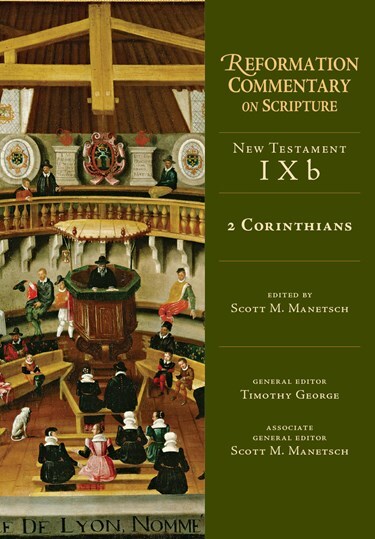
"Therefore, if anyone is in Christ, he is a new creation. The old has passed away; behold, the new has come."
When the Reformers of the sixteenth century turned to this biblical text, originally written by Paul to the first-century church in Corinth, they found truths that apply to Christians regardless of their historical context. For example, Reformed theologian Wolfgang Musculus wrote, "To be a Christian is to be in Christ. If anyone is outside of Christ, he is not a Christian. It is easy to partake of the sacraments and to be of the name and profession of Christ, but that is not what it means to be in Christ... The largest part of Christians is still an old creature for they have not yet been regenerated and renewed by the spirit of Christ. To know a Christian, therefore, we should not so much examine his external profession, but his life."
In this volume of the Reformation Commentary on Scripture, Reformation scholar Scott Manetsch guides readers through a wealth of early modern commentary on the book of 2 Corinthians. Readers will hear from familiar voices and discover lesser-known figures from a diversity of theological traditions, including Lutherans, Reformed, Radicals, Anglicans and Roman Catholics. Drawing upon a variety of resources—including commentaries, sermons, treatises, and confessions—much of which appears here for the first time in English, this volume provides resources for contemporary preachers, enables scholars to better understand the depth and breadth of Reformation commentary, and seeks to encourage all those who would be newly created in Christ.
The Reformation Commentary on Scripture Series
The Reformation Commentary on Scripture (RCS) provides a crucial link between the contemporary church and the great cloud of witnesses that is the historical church. The biblical insights and rhetorical power of the tradition of the Reformation are here made available as a powerful tool for the church of the twenty-first century. Like never before, believers can feel they are a part of a genuine tradition of renewal as they faithfully approach the Scriptures.
In each RCS volume you will find the biblical text in English, from the English Standard Version (ESV), alongside the insights of the leaders of the Reformation. Hear from landmark figures such as Luther and Calvin, as well as lesser-known commentators such as Peter Martyr Vermigli, Johannes Oecolampadius, Martin Bucer, Johannes Brenz, Caspar Cruciger, Giovanni Diodati, and Kaspar Olevianus. The series introduces you to the great diversity that constituted the Reformation, with commentary from Lutheran, Reformed, Anglican, Anabaptist and even reform-minded Catholic thinkers, who all shared a commitment to the faithful exposition of Scripture.
Each volume is designed to facilitate a rich research experience for preachers and teachers, and contains a unique introduction written by the volume editor, providing a reliable guide to the history of the period, the unique reception of the canon of Scripture and an orientation to the thinkers featured in the volume. Many of these texts are being published in English for the first time, and volumes also contain biographies of figures from the Reformation era, adding an essential reference for students of church history.
Scott M. Manetsch (PhD, University of Arizona) is professor of church history at Trinity Evangelical Divinity School. He is the associate general editor of the Reformation Commentary on Scripture and the author of Calvin's Company of Pastors: Pastoral Care and the Emerging Reformed Church, 1536-1609.
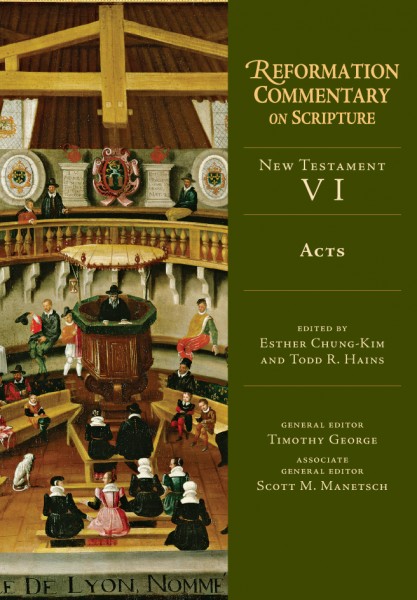
The Reformation was a call to return with renewed vigor to the biblical roots of Christian faith and practice. Still, for the Reformers, the truth of the Bible could never be separated from the true community of God's people gathered by his Word. In the book of Acts, they found God's blueprint for how the church should participate with the Holy Spirit in accomplishing his purposes in the world.
In the latest Reformation Commentary on Scripture, we watch as the diverse streams of the Protestant movement converge on the book of Acts. As we return with the Reformers to this vision of Spirit-filled community, we are given a lesson in the nature of biblical reform from those who bore it out for the first time. Authors Esther Chung-Kim and Todd R. Hains present a vivid portrait of the Reformers? views on the contemporary church?s faithfulness to its God-given identity and calling.
The Reformers approached the narrative account of the early church in the book of Acts from diverse viewpoints. Commentators like John Calvin and the Swiss Reformed Heinrich Bullinger elaborated on the theological implications of the text with a great deal of historical detail. Others like reform-minded Catholic Johann Eck evoked episodes in Acts in response to pressing concerns of the day. Sermons upheld notable characters in Acts such as Peter, Stephen, Paul, Lydia and Apollos as examples of robust faith and of life in Christian community. Anabaptists in their apologetic works focused heavily on the necessity of believer's baptism.
The commentators' interactions range from irate disagreement to irenic concord, but all exhort their readers not to dissolve "the holy knot" of the plain history of Christ's works and their lasting fruits. For them, Acts is certainly history, but it cannot be mere history.
The Reformation Commentary on Scripture Series
The Reformation Commentary on Scripture (RCS) provides a crucial link between the contemporary church and the great cloud of witnesses that is the historical church. The biblical insights and rhetorical power of the tradition of the Reformation are here made available as a powerful tool for the church of the twenty-first century. Like never before, believers can feel they are a part of a genuine tradition of renewal as they faithfully approach the Scriptures.
In each RCS volume you will find the biblical text in English, from the English Standard Version (ESV), alongside the insights of the leaders of the Reformation. Hear from landmark figures such as Luther and Calvin, as well as lesser-known commentators such as Peter Martyr Vermigli, Johannes Oecolampadius, Martin Bucer, Johannes Brenz, Caspar Cruciger, Giovanni Diodati, and Kaspar Olevianus. The series introduces you to the great diversity that constituted the Reformation, with commentary from Lutheran, Reformed, Anglican, Anabaptist and even reform-minded Catholic thinkers, who all shared a commitment to the faithful exposition of Scripture.
Each volume is designed to facilitate a rich research experience for preachers and teachers, and contains a unique introduction written by the volume editor, providing a reliable guide to the history of the period, the unique reception of the canon of Scripture and an orientation to the thinkers featured in the volume. Many of these texts are being published in English for the first time, and volumes also contain biographies of figures from the Reformation era, adding an essential reference for students of church history.
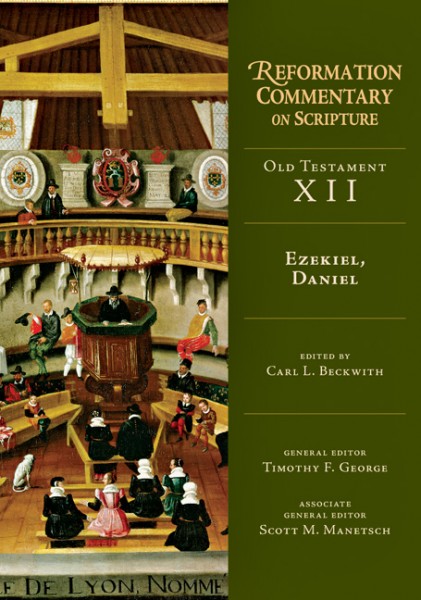
The Reformation era revolution in preaching and interpreting the Bible did not occur without keen attention to the Old Testament Scriptures. This is especially true with regard to the Hebrew prophets. Ezekiel and Daniel, replete with startling, unnerving imagery and visions, apocalyptic oracles of judgment and destruction, captivated the reformers as they sought to understand their time and themselves through the lens of Scripture. Equally, these prophetic books underscored the covenantal promises to God's people and the hope of restoration, which the Reformers understood to be the righteousness of Christ made available in faith.
Reformation commentary on the prophets Ezekiel and Daniel are windows into the biblical, theological and pastoral minds of the reformers as they engage the details of the texts, make theological judgments and apply fresh reading of Scripture to their contemporary hearers. Familiar passages, such as Ezekiel's dazzling vision of the wheels, the building of the temple, or Daniel's four beasts, are given new layers and textures.
This volume collects the comments of the monumental figures like Luther, Calvin and Melancthon, alongside many lesser known and read thinkers, such as Heinrich Bullinger, Hans Denck, Giovanni Diodati, Johann Gerhard, John Mayer, Matthew Mead, Johann Oecolampadius, Jakob Raupius, Johann Wigand and Andrew Willet. Several beloved English Puritans are included as well: Richard Baxter, John Bunyan, Thomas Manton and John Owen. The wealth of Reformation interpretation on these books of Scripture is brought together for the first time.
The Reformation Commentary on Scripture Series
The Reformation Commentary on Scripture (RCS) provides a crucial link between the contemporary church and the great cloud of witnesses that is the historical church. The biblical insights and rhetorical power of the tradition of the Reformation are here made available as a powerful tool for the church of the twenty-first century. Like never before, believers can feel they are a part of a genuine tradition of renewal as they faithfully approach the Scriptures.
In each RCS volume you will find the biblical text in English, from the English Standard Version (ESV), alongside the insights of the leaders of the Reformation. Hear from landmark figures such as Luther and Calvin, as well as lesser-known commentators such as Peter Martyr Vermigli, Johannes Oecolampadius, Martin Bucer, Johannes Brenz, Caspar Cruciger, Giovanni Diodati, and Kaspar Olevianus. The series introduces you to the great diversity that constituted the Reformation, with commentary from Lutheran, Reformed, Anglican, Anabaptist and even reform-minded Catholic thinkers, who all shared a commitment to the faithful exposition of Scripture.
Each volume is designed to facilitate a rich research experience for preachers and teachers, and contains a unique introduction written by the volume editor, providing a reliable guide to the history of the period, the unique reception of the canon of Scripture and an orientation to the thinkers featured in the volume. Many of these texts are being published in English for the first time, and volumes also contain biographies of figures from the Reformation era, adding an essential reference for students of church history.
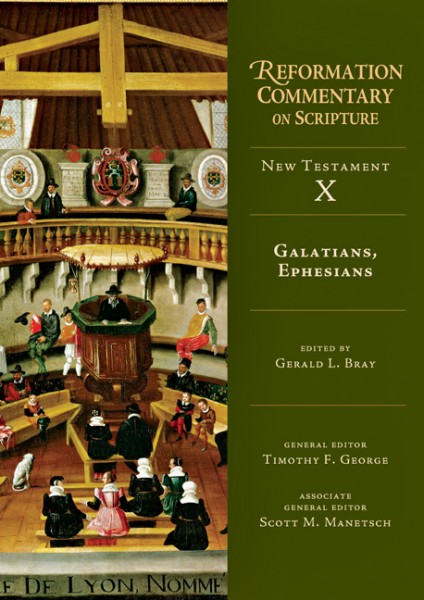
The gospel of justification by faith alone was discovered afresh by the Reformers in the epistolary turrets of the New Testament: the letters to the Galatians and the Ephesians.
At the epicenter of the exegetical revolution that rocked the Reformation era was Paul's letter to the Galatians. There Luther, Calvin, Bullinger and scores of others perceived the true gospel of Paul enlightening a situation parallel to their own times--the encroachment of false teachers and apostates upon the true teaching of salvation by grace through faith.
In Ephesians, the Reformers gravitated to what they understood to be the summit of Paul's vision of salvation in Christ. Finding its source, beyond time, in the electing love of God, the Reformers disseminated the letter?s message of temporal hope for Christians living under the duress of persecution.
For the Reformers, these epistles were living, capsule versions of Paul's letter to the Romans, briefs on the theological vision of the celebrated apostle. Probed and expounded in the commentaries and sermons found in this volume, these letters became the very breath in the lungs of the Reformation movements.
The range of comment on Galatians and Ephesians here spans Latin, German, French, Dutch and English authors from a variety of streams within the Protestant movement. Especially helpful in this volume is Gerald Bray's editorial presentation of the development of tensions among the Reformers.
The epistles of Galatians and Ephesians open up a treasure house of ancient wisdom, allowing these faithful Reformation witnesses to speak with eloquence and intellectual acumen to the church today.
The Reformation Commentary on Scripture Series
The Reformation Commentary on Scripture (RCS) provides a crucial link between the contemporary church and the great cloud of witnesses that is the historical church. The biblical insights and rhetorical power of the tradition of the Reformation are here made available as a powerful tool for the church of the twenty-first century. Like never before, believers can feel they are a part of a genuine tradition of renewal as they faithfully approach the Scriptures.
In each RCS volume you will find the biblical text in English, from the English Standard Version (ESV), alongside the insights of the leaders of the Reformation. Hear from landmark figures such as Luther and Calvin, as well as lesser-known commentators such as Peter Martyr Vermigli, Johannes Oecolampadius, Martin Bucer, Johannes Brenz, Caspar Cruciger, Giovanni Diodati, and Kaspar Olevianus. The series introduces you to the great diversity that constituted the Reformation, with commentary from Lutheran, Reformed, Anglican, Anabaptist and even reform-minded Catholic thinkers, who all shared a commitment to the faithful exposition of Scripture.
Each volume is designed to facilitate a rich research experience for preachers and teachers, and contains a unique introduction written by the volume editor, providing a reliable guide to the history of the period, the unique reception of the canon of Scripture and an orientation to the thinkers featured in the volume. Many of these texts are being published in English for the first time, and volumes also contain biographies of figures from the Reformation era, adding an essential reference for students of church history.
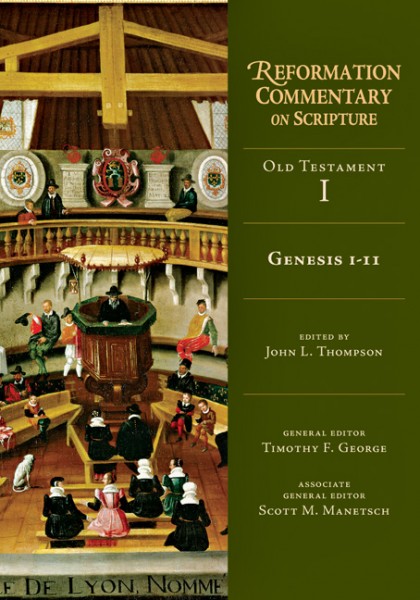
The first chapters of Genesis are the bedrock of the Jewish and Christian traditions. In these inaugural pages of the canon, the creation of the world, the fall of the human creature, the promise of redemption and the beginning of salvation history are found. Interwoven in the text are memorable stories of the ancient biblical patriarchs and matriarchs.
Throughout the history of commentary, interpreters have lavished attention on the rich passages recounting the six days of creation, the tragic fall of God's creature--from the expulsion of the first parents to Cain's fratricide and the catastrophe of the Flood--as well as the allegorical sign of hope in the ark of Noah. Commentators in the Reformation continued this venerable tradition of detailed focus on these primordial stories, finding themselves and their era deeply connected to the tragedies and promises, the genealogies and marvels of God's providential election and governance. Above all, Reformation-era interpreters found anchor for their teaching, preaching and hope in the promise of Christ running through these first chapters, from creation to the calling of Abraham.
While following the precedent of patristic and medieval commentators on Scripture, as well as Rabbinic midrash, the Reformers provide insightful and startling fresh readings of familiar passages, inviting readers to see the ancient text with new eyes. This volume collects the comments of not only the monumental thinkers like Luther, Calvin and Melancthon, but also many important figures of the time who are lesser-known today. Here we find rich fare from Johannes Brenz, Wolfgang Capito, Hans Denck, Wolfgang Musculus, Johannes Oecolampadius and Peter Martyr Vermigli.
Readers will encounter comments from a wide array of perspectives, from the magisterial Reformers to radical Protestants like Balthasar Hubmaier, Menno Simons, Pilgram Marpeck and Dirk Philips, as well as some Catholic thinkers, such as Desiderius Erasmus and Cardinal Cajetan. Important contributions from female voices, like Katharina Schütz Zell and Anna Maria van Schurman are included also. The wealth of Reformation interpretation is brought together here for study and reflection, much appearing in English for the first time.
The Reformation Commentary on Scripture Series
The Reformation Commentary on Scripture (RCS) provides a crucial link between the contemporary church and the great cloud of witnesses that is the historical church. The biblical insights and rhetorical power of the tradition of the Reformation are here made available as a powerful tool for the church of the twenty-first century. Like never before, believers can feel they are a part of a genuine tradition of renewal as they faithfully approach the Scriptures.
In each RCS volume you will find the biblical text in English, from the English Standard Version (ESV), alongside the insights of the leaders of the Reformation. Hear from landmark figures such as Luther and Calvin, as well as lesser-known commentators such as Peter Martyr Vermigli, Johannes Oecolampadius, Martin Bucer, Johannes Brenz, Caspar Cruciger, Giovanni Diodati, and Kaspar Olevianus. The series introduces you to the great diversity that constituted the Reformation, with commentary from Lutheran, Reformed, Anglican, Anabaptist and even reform-minded Catholic thinkers, who all shared a commitment to the faithful exposition of Scripture.
Each volume is designed to facilitate a rich research experience for preachers and teachers, and contains a unique introduction written by the volume editor, providing a reliable guide to the history of the period, the unique reception of the canon of Scripture and an orientation to the thinkers featured in the volume. Many of these texts are being published in English for the first time, and volumes also contain biographies of figures from the Reformation era, adding an essential reference for students of church history.
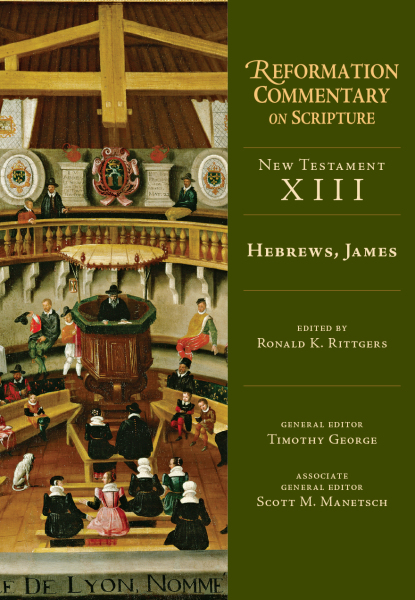
“Faith is the assurance of things hoped for, the conviction of things not seen,” wrote the author of the epistle to the Hebrews.
Reflecting on this verse and the epistle’s description of the high priestly and sacrificial ministry of Jesus Christ, Swiss Reformed theologian and exegete Heinrich Bullinger defined faith as “the most constant mental certainty, which rests on those things to which all our hope is directed, namely . . . the expectation of salvation and the recognition of our truly blessed God and Savior, who is the inexhaustible fountain of all good.”
Both the epistle to the Hebrews and the epistle of James generated much discussion and debate during the Reformation period. The author of the former is unknown, and the latter was dismissively labeled as an “epistle of straw” by Martin Luther. Yet both of these letters have proven to be essential for Christians—during the Reformation era and today—who seek to understand the significance of the work of Jesus Christ and what it means to follow him.
In this volume of the Reformation Commentary on Scripture, church historian and theologian Ronald K. Rittgers guides readers through a diversity of early modern commentary on both Hebrews and James. Readers will hear from familiar voices as well as lesser-known figures from a variety of theological traditions, including Lutherans, Reformed, Radicals, Anglicans, and Roman Catholics.
Drawing on a variety of resources—including commentaries, sermons, treatises, and confessions—much of which appears here for the first time in English, this volume provides resources for contemporary preachers, enables scholars to better understand the depth and breadth of Reformation commentary, and helps all who seek the assurance and conviction that is found in Christ alone.
The Reformation Commentary on Scripture Series
The Reformation Commentary on Scripture (RCS) provides a crucial link between the contemporary church and the great cloud of witnesses that is the historical church. The biblical insights and rhetorical power of the tradition of the Reformation are here made available as a powerful tool for the church of the twenty-first century. Like never before, believers can feel they are a part of a genuine tradition of renewal as they faithfully approach the Scriptures.
In each RCS volume you will find the biblical text in English, from the English Standard Version (ESV), alongside the insights of the leaders of the Reformation. Hear from landmark figures such as Luther and Calvin, as well as lesser-known commentators such as Peter Martyr Vermigli, Johannes Oecolampadius, Martin Bucer, Johannes Brenz, Caspar Cruciger, Giovanni Diodati, and Kaspar Olevianus. The series introduces you to the great diversity that constituted the Reformation, with commentary from Lutheran, Reformed, Anglican, Anabaptist and even reform-minded Catholic thinkers, who all shared a commitment to the faithful exposition of Scripture.
Each volume is designed to facilitate a rich research experience for preachers and teachers, and contains a unique introduction written by the volume editor, providing a reliable guide to the history of the period, the unique reception of the canon of Scripture and an orientation to the thinkers featured in the volume. Many of these texts are being published in English for the first time, and volumes also contain biographies of figures from the Reformation era, adding an essential reference for students of church history.
Ronald K. Rittgers (PhD, Harvard University) holds the Erich Markel Chair in German Reformation Studies at Valparaiso University, where he also serves as professor of history and theology. He is the author of The Reformation of Suffering: Pastoral Theology and Lay Piety in Late Medieval and Early Modern Germany and The Reformation of the Keys: Confession, Conscience, and Authority in Sixteenth-Century Germany. He has also served as the president of the American Society of Church History.
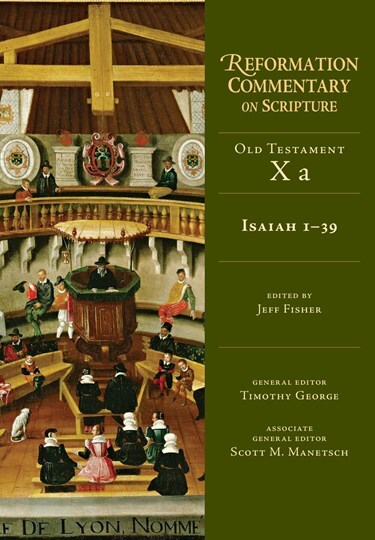
"And I heard the voice of the Lord saying, 'Whom shall I send, and who will go for us?'
Then I said, 'Here I am! Send me.'"
In his interpretation of Isaiah's vision of God and subsequent sending, the Anabaptist reformer Menno Simons perceived a pattern for all prophets, apostles, ministers, and preachers who are called and then sent out to spread the good news: "They did not assume the honor to themselves, as do the preachers of this world; but like Aaron, they were called by God...They were brought by the Spirit of God, with pious hearts, into his service; they had always esteemed themselves unfit to serve the people of God or to stand forth in such a high and responsible station...No one can serve in this high and holy office, conformably to God's will, except those whom the Lord of the vineyard has made worthy and fit by the spirit of his grace."
In this volume of the Reformation Commentary on Scripture, Reformation scholar Jeff Fisher guides readers through a wealth of early-modern commentary on the first thirty-nine chapters of Isaiah. Readers will hear familiar voices and discover lesser-known figures from a diversity of theological traditions, including Lutherans, Reformed, Radicals, Anglicans, and Roman Catholics. Drawing on a variety of resources—including commentaries, sermons, treatises, and confessions—much of which appears here for the first time in English, this volume provides resources for contemporary preachers, enables scholars to better understand the depth and breadth of Reformation commentary, and seeks to help those who have been called to this task and those whom they serve.
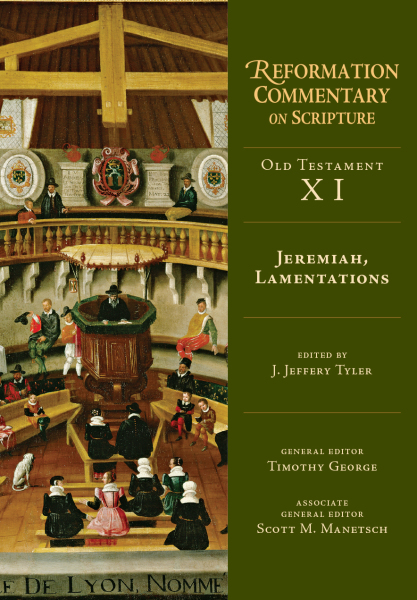
The prophetic ministry of Jeremiah, described in the Old Testament books of Jeremiah and Lamentations, took place during a time of chaos and tragedy for the people of Israel: the fall of Jerusalem, the destruction of the temple, and the exile to Babylon. Yet, in the midst of this loss and in hope of the restoration of God's people, Jeremiah is able to declare: "The steadfast love of the Lord never ceases; his mercies never come to an end; they are new every morning; great is your faithfulness" (Lam 3:22-23).
Reflecting on these verses, Reformation commentators, who were themselves familiar with the turbulent realities of their own sixteenth century, heard not only hope for the renewal of Israel, but prophetic promise for the coming of the Messiah. Lutheran theologian and pastor Nikolaus Selnecker wrote, "Is not what Jeremiah says immeasurably beautiful, lovely, and consoling? You will think, what is my soul saying to me? That is a strong Amen, when the spirit of the heart knows and can say, 'God hears me, I know it. My heart tells me. I do not doubt God's grace. I am a child of God. He is my father and will help me.'"
In this volume of the Reformation Commentary on Scripture, church historian J. Jeffery Tyler guides readers through a diversity of early modern commentary on the books of Jeremiah and Lamentations. Readers will hear from familiar voices and discover lesser-known figures from a variety of theological traditions, including Lutherans, Reformed, Radicals, Anglicans, and Roman Catholics. Drawing upon a variety of resources—including commentaries, sermons, treatises, and confessions—much of which appears here for the first time in English, this volume provides resources for contemporary preachers, enables scholars to better understand the depth and breadth of Reformation commentary, and seeks to help everyone remember that God's mercies never come to an end.
The Reformation Commentary on Scripture Series
The Reformation Commentary on Scripture (RCS) provides a crucial link between the contemporary church and the great cloud of witnesses that is the historical church. The biblical insights and rhetorical power of the tradition of the Reformation are here made available as a powerful tool for the church of the twenty-first century. Like never before, believers can feel they are a part of a genuine tradition of renewal as they faithfully approach the Scriptures.
In each RCS volume you will find the biblical text in English, from the English Standard Version (ESV), alongside the insights of the leaders of the Reformation. Hear from landmark figures such as Luther and Calvin, as well as lesser-known commentators such as Peter Martyr Vermigli, Johannes Oecolampadius, Martin Bucer, Johannes Brenz, Caspar Cruciger, Giovanni Diodati, and Kaspar Olevianus. The series introduces you to the great diversity that constituted the Reformation, with commentary from Lutheran, Reformed, Anglican, Anabaptist and even reform-minded Catholic thinkers, who all shared a commitment to the faithful exposition of Scripture.
Each volume is designed to facilitate a rich research experience for preachers and teachers, and contains a unique introduction written by the volume editor, providing a reliable guide to the history of the period, the unique reception of the canon of Scripture and an orientation to the thinkers featured in the volume. Many of these texts are being published in English for the first time, and volumes also contain biographies of figures from the Reformation era, adding an essential reference for students of church history.
J. Jeffery Tyler (PhD, University of Arizona) is professor of religion at Hope College. He is the author of Lord of the Sacred City: The 'Episcopus Exclusus' in Late Medieval and Early Modern Germany.

The first eighteen verses of the Gospel of John make some of the most profound statements about the character and work of Christ in all of Scripture: 'In the beginning was the Word, and the Word was with God, and the Word was God' (1:1); 'all things were made through him' (1:3); 'the Word became flesh and dwelt among us' (1:14).
Reformation commentators ruminated on the meaning and implications of such claims for shedding light on doctrines like the Trinity, the divinity of Christ and his incarnation, but also for grasping the saving benefits of Christ's work in justification (for those 'who believed in his name') and new birth (those born of God as his children, 1:12-13).
In this volume, Craig Farmer expertly guides readers through Reformation meditation on these themes and many others as they are unpacked in the first twelve chapters of the Gospel of John, from the Prologue to Jesus' triumphal entry into Jerusalem. Here you will find a rich mosaic of reflection on the Gospel of John by a variety of significant well-known and lesser-known figures among the Reformed, Lutherans, Radicals and Roman Catholics. Farmer has done justice to the depth and nuance of the work of these Reformation-era pastors and scholars by drawing from a range of genres--extensive commentary, brief annotations, impassioned sermons, official confessions, and careful doctrinal and practical treatises.
Contemporary scholars will find this volume indispensable for understanding the significance of the 'spiritual Gospel' for Reformation theology and practice, and pastors will discover here a consistently fruitful source for preaching, teaching and discipleship in the 'grace and truth' that have come through Jesus Christ (1:17).
The Reformation Commentary on Scripture Series
The Reformation Commentary on Scripture (RCS) provides a crucial link between the contemporary church and the great cloud of witnesses that is the historical church. The biblical insights and rhetorical power of the tradition of the Reformation are here made available as a powerful tool for the church of the twenty-first century. Like never before, believers can feel they are a part of a genuine tradition of renewal as they faithfully approach the Scriptures.
In each RCS volume you will find the biblical text in English, from the English Standard Version (ESV), alongside the insights of the leaders of the Reformation. Hear from landmark figures such as Luther and Calvin, as well as lesser-known commentators such as Peter Martyr Vermigli, Johannes Oecolampadius, Martin Bucer, Johannes Brenz, Caspar Cruciger, Giovanni Diodati, and Kaspar Olevianus. The series introduces you to the great diversity that constituted the Reformation, with commentary from Lutheran, Reformed, Anglican, Anabaptist and even reform-minded Catholic thinkers, who all shared a commitment to the faithful exposition of Scripture.
Each volume is designed to facilitate a rich research experience for preachers and teachers, and contains a unique introduction written by the volume editor, providing a reliable guide to the history of the period, the unique reception of the canon of Scripture and an orientation to the thinkers featured in the volume. Many of these texts are being published in English for the first time, and volumes also contain biographies of figures from the Reformation era, adding an essential reference for students of church history.
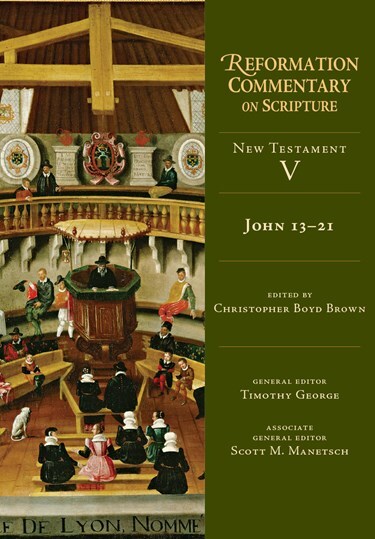
After he had washed the disciples' feet, Jesus said, "Just as I have loved you, you also are to love one another."
The second half of the Gospel of John, sometimes called the most "theological" of the Gospels, includes John's account of Jesus' final night with his disciples, his betrayal and arrest, his crucifixion, his resurrection, and his appearances to his disciples.
When the Reformers of the sixteenth century turned to the fourth Gospel, they found a multitude of theological treasures: a clear affirmation of the full divinity of Christ; insights into the relationships among the Father, Son, and Holy Spirit; and guidance for the church in their time. For example, John Calvin claimed, "This Gospel is a key to open the door for understanding the rest; for whoever shall understand the power of Christ, as it is here strikingly portrayed, will afterwards read with advantage what the others relate about the Redeemer who was manifested."
In this volume of the Reformation Commentary on Scripture, church historian Christopher Boyd Brown guides readers through a diversity of early modern commentary on chapters 13–21 of the Gospel of John. Readers will hear from familiar voices and discover lesser-known figures from a range of theological traditions, including Lutherans, Reformed, Radicals, Anglicans, and Roman Catholics. Drawing upon a variety of resources—including commentaries, sermons, treatises, and confessions—much of which appears here for the first time in English, this volume provides resources for contemporary preachers, enables scholars to better understand the depth and breadth of Reformation commentary, and seeks to encourage all those who desire to love as Jesus loves.
The Reformation Commentary on Scripture Series
The Reformation Commentary on Scripture (RCS) provides a crucial link between the contemporary church and the great cloud of witnesses that is the historical church. The biblical insights and rhetorical power of the tradition of the Reformation are here made available as a powerful tool for the church of the twenty-first century. Like never before, believers can feel they are a part of a genuine tradition of renewal as they faithfully approach the Scriptures.
In each RCS volume you will find the biblical text in English, from the English Standard Version (ESV), alongside the insights of the leaders of the Reformation. Hear from landmark figures such as Luther and Calvin, as well as lesser-known commentators such as Peter Martyr Vermigli, Johannes Oecolampadius, Martin Bucer, Johannes Brenz, Caspar Cruciger, Giovanni Diodati, and Kaspar Olevianus. The series introduces you to the great diversity that constituted the Reformation, with commentary from Lutheran, Reformed, Anglican, Anabaptist and even reform-minded Catholic thinkers, who all shared a commitment to the faithful exposition of Scripture.
Each volume is designed to facilitate a rich research experience for preachers and teachers, and contains a unique introduction written by the volume editor, providing a reliable guide to the history of the period, the unique reception of the canon of Scripture and an orientation to the thinkers featured in the volume. Many of these texts are being published in English for the first time, and volumes also contain biographies of figures from the Reformation era, adding an essential reference for students of church history.
Christopher Boyd Brown (PhD, Harvard University) is associate professor of church history at Boston University School of Theology. He is the author of Singing the Gospel: Lutheran Hymns and the Success of the Reformation and the general editor of the American edition of Luther's Works.
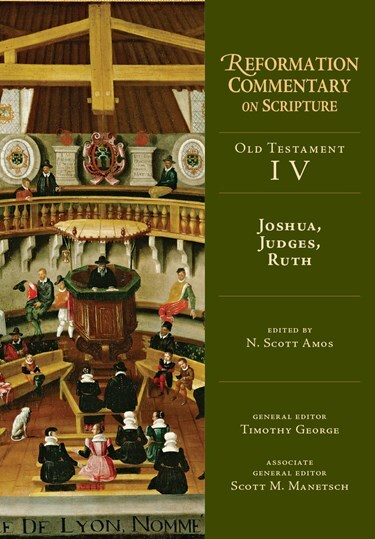
"Where you go I will go, and where you lodge I will lodge. Your people shall be my people, and your God my God."
Ruth's response to her mother-in-law Naomi demonstrated both Ruth's loyalty to her family and her trust in God. The Reformers of the sixteenth century found theological significance in such Old Testament narratives. For example, German Lutheran pastor and theologian Johannes Brenz perceived in her confession a foreshadowing of the gospel: "Ruth the Moabitess is recorded in the genealogy of Christ, that it might be made known that Christ belongs not only to the Jews but also to the Gentiles."
In this volume of the Reformation Commentary on Scripture, N. Scott Amos guides readers through a wealth of early modern commentary on the Old Testament books of Joshua, Judges, and Ruth. Readers will hear from familiar voices and discover lesser-known figures from a diversity of theological traditions, including Lutherans, Reformed, Radicals, Anglicans and Roman Catholics. Drawing upon a variety of resources—from commentaries and sermons to treatises and confessions—much of which appears here for the first time in English, this volume provides resources for contemporary preachers, enables scholars to better understand the depth and breadth of Reformation commentary, and seeks to encourage all those who would, like Ruth, declare their allegiance to God.
The Reformation Commentary on Scripture Series
The Reformation Commentary on Scripture (RCS) provides a crucial link between the contemporary church and the great cloud of witnesses that is the historical church. The biblical insights and rhetorical power of the tradition of the Reformation are here made available as a powerful tool for the church of the twenty-first century. Like never before, believers can feel they are a part of a genuine tradition of renewal as they faithfully approach the Scriptures.
In each RCS volume you will find the biblical text in English, from the English Standard Version (ESV), alongside the insights of the leaders of the Reformation. Hear from landmark figures such as Luther and Calvin, as well as lesser-known commentators such as Peter Martyr Vermigli, Johannes Oecolampadius, Martin Bucer, Johannes Brenz, Caspar Cruciger, Giovanni Diodati, and Kaspar Olevianus. The series introduces you to the great diversity that constituted the Reformation, with commentary from Lutheran, Reformed, Anglican, Anabaptist and even reform-minded Catholic thinkers, who all shared a commitment to the faithful exposition of Scripture.
Each volume is designed to facilitate a rich research experience for preachers and teachers, and contains a unique introduction written by the volume editor, providing a reliable guide to the history of the period, the unique reception of the canon of Scripture and an orientation to the thinkers featured in the volume. Many of these texts are being published in English for the first time, and volumes also contain biographies of figures from the Reformation era, adding an essential reference for students of church history.
N. Scott Amos (PhD, University of St. Andrews) is professor of history at the University of Lynchburg. He is the author of Bucer, Ephesians, and Biblical Humanism: The Exegete as Theologian and the coeditor of The Education of a Christian Society: Humanism and the Reformation in Britain and the Netherlands.
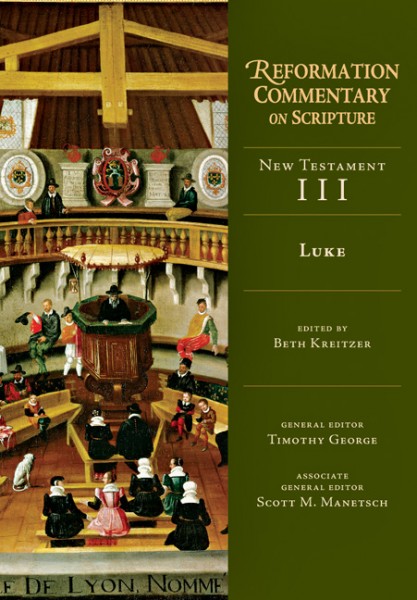
"For unto you is born this day in the city of David a Savior, who is Christ the Lord." Reflecting on this verse from the Gospel of Luke (2:11), Martin Luther declared it to be a summary of the gospel: "See here what the gospel is, namely, a joyful sermon about Christ our Savior. Whoever preaches him rightly preaches the gospel and pure joy."
Reformation commentators meditated upon the significance of the good news of Jesus Christ during a vibrant era in the history of the church that was characterized by spiritual renewal and reform, doctrinal controversy (especially over matters such as the presence of Christ in the Lord?s Supper) and the overriding desire to understand the meaning and implications of Scripture for Christian belief and practice. While in many ways similar to the other Synoptic Gospels, the Gospel of Luke also testified to this good news through unique material, including the announcement of Jesus? birth to the shepherds in the fields, the parable of the prodigal son and Jesus? appearance to his disciples on the road to Emmaus after his resurrection.
In this volume, Beth Kreitzer skillfully leads readers through the rich diversity of Reformation commentary on the Gospel of Luke. Readers will be able to listen to both well-known and lesser-known voices from a variety of theological traditions, including Lutherans, Reformed, Radicals, Anglicans and Roman Catholics, many of whose comments appear for the first time in English. By drawing from an array of Reformation resources - including commentaries, sermons, treatises and confessions - this volume will equip scholars to understand better the depth and breadth of Reformation commentary, and it will provide contemporary preachers with resources from those in the Reformation church who sought to understand the meaning of this "good news of great joy" (2:10).
The Reformation Commentary on Scripture Series
The Reformation Commentary on Scripture (RCS) provides a crucial link between the contemporary church and the great cloud of witnesses that is the historical church. The biblical insights and rhetorical power of the tradition of the Reformation are here made available as a powerful tool for the church of the twenty-first century. Like never before, believers can feel they are a part of a genuine tradition of renewal as they faithfully approach the Scriptures.
In each RCS volume you will find the biblical text in English, from the English Standard Version (ESV), alongside the insights of the leaders of the Reformation. Hear from landmark figures such as Luther and Calvin, as well as lesser-known commentators such as Peter Martyr Vermigli, Johannes Oecolampadius, Martin Bucer, Johannes Brenz, Caspar Cruciger, Giovanni Diodati, and Kaspar Olevianus. The series introduces you to the great diversity that constituted the Reformation, with commentary from Lutheran, Reformed, Anglican, Anabaptist and even reform-minded Catholic thinkers, who all shared a commitment to the faithful exposition of Scripture.
Each volume is designed to facilitate a rich research experience for preachers and teachers, and contains a unique introduction written by the volume editor, providing a reliable guide to the history of the period, the unique reception of the canon of Scripture and an orientation to the thinkers featured in the volume. Many of these texts are being published in English for the first time, and volumes also contain biographies of figures from the Reformation era, adding an essential reference for students of church history.
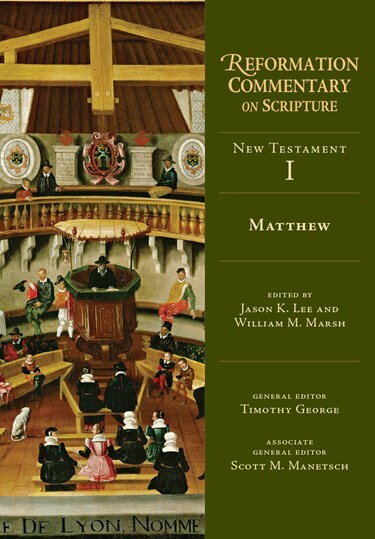
"As they were eating, Jesus took bread, and after blessing it broke it and gave it to the disciples, and said, 'Take, eat; this is my body.'"
How should one interpret these words of Jesus?
The sixteenth-century Reformers turned to Scripture to find the truth of God's Word, but that doesn't mean they always agreed on how to interpret it. For example, when approaching this passage from Matthew's gospel, Martin Luther read it literally, for "as he says in his own words, it is his body and his blood," but Thomas Cranmer argued that "there must be some figure or mystery in this speech."
In this Reformation Commentary on Scripture volume, scholars Jason K. Lee and William Marsh guide readers through a wealth of early modern commentary on the book of Matthew. Readers will hear from familiar voices and discover lesser-known figures from a diversity of theological traditions, including Lutherans, Reformed, Radicals, Anglicans and Roman Catholics.
Drawing upon a variety of resources—including commentaries, sermons, treatises, and confessions—much of which appears here for the first time in English, this volume provides resources for contemporary preachers, enables scholars to better understand the depth and breadth of Reformation commentary, and seeks to encourage all those who desire to read the words of Scripture faithfully.
The Reformation Commentary on Scripture Series
The Reformation Commentary on Scripture (RCS) provides a crucial link between the contemporary church and the great cloud of witnesses that is the historical church. The biblical insights and rhetorical power of the tradition of the Reformation are here made available as a powerful tool for the church of the twenty-first century. Like never before, believers can feel they are a part of a genuine tradition of renewal as they faithfully approach the Scriptures.
In each RCS volume you will find the biblical text in English, from the English Standard Version (ESV), alongside the insights of the leaders of the Reformation. Hear from landmark figures such as Luther and Calvin, as well as lesser-known commentators such as Peter Martyr Vermigli, Johannes Oecolampadius, Martin Bucer, Johannes Brenz, Caspar Cruciger, Giovanni Diodati, and Kaspar Olevianus. The series introduces you to the great diversity that constituted the Reformation, with commentary from Lutheran, Reformed, Anglican, Anabaptist and even reform-minded Catholic thinkers, who all shared a commitment to the faithful exposition of Scripture.
Each volume is designed to facilitate a rich research experience for preachers and teachers, and contains a unique introduction written by the volume editor, providing a reliable guide to the history of the period, the unique reception of the canon of Scripture and an orientation to the thinkers featured in the volume. Many of these texts are being published in English for the first time, and volumes also contain biographies of figures from the Reformation era, adding an essential reference for students of church history.
Jason K. Lee (PhD, University of Aberdeen) is professor of theological studies at Cedarville University. He is the author of The Theology of John Smyth: Puritan, Separatist, Baptist, Mennonite and the co-editor of The Seminary as a Textual Community.

Paul's letters to the Philippians and Colossians celebrate the glory and supremacy of Jesus Christ and his saving work, a refrain that the reformers never grew tired of singing. While their tones are diverse, the clarity of their compositions and the power of their voices still reverberate today.
Reformation commentators found the main themes of these Pauline letters deeply applicable to their circumstances, and volume editor Graham Tomlin urges that they are just as relevant to our own: Philippians overflows with thanksgiving in the midst of persecution and trials; Colossians defends the superiority of Jesus as Lord over all principalities and powers. For the Reformers as well as for Paul, all goodness and grace flows from Christ in whom 'all the fullness of God was pleased to dwell' (Col 1:19), the Son who 'made himself nothing' (Phil 2:7) in order to bring many daughters and sons to glory.
This volume assembles a diverse chorus spanning place, time, and confessional differences: from Italian Reform-minded Catholic Gasparo Contarini and German Lutheran Martin Chemnitz, to Dutch Anabaptist Menno Simons, to French Reformed Theodore Beza and English Puritan Richard Sibbes. Scholars and pastors alike will find many fruitful insights from these and a number of other significant figures--most of whom enjoy fresh translations from the original, many for the first time in English.
The Reformation Commentary on Scripture Series
The Reformation Commentary on Scripture (RCS) provides a crucial link between the contemporary church and the great cloud of witnesses that is the historical church. The biblical insights and rhetorical power of the tradition of the Reformation are here made available as a powerful tool for the church of the twenty-first century. Like never before, believers can feel they are a part of a genuine tradition of renewal as they faithfully approach the Scriptures.
In each RCS volume you will find the biblical text in English, from the English Standard Version (ESV), alongside the insights of the leaders of the Reformation. Hear from landmark figures such as Luther and Calvin, as well as lesser-known commentators such as Peter Martyr Vermigli, Johannes Oecolampadius, Martin Bucer, Johannes Brenz, Caspar Cruciger, Giovanni Diodati, and Kaspar Olevianus. The series introduces you to the great diversity that constituted the Reformation, with commentary from Lutheran, Reformed, Anglican, Anabaptist and even reform-minded Catholic thinkers, who all shared a commitment to the faithful exposition of Scripture.
Each volume is designed to facilitate a rich research experience for preachers and teachers, and contains a unique introduction written by the volume editor, providing a reliable guide to the history of the period, the unique reception of the canon of Scripture and an orientation to the thinkers featured in the volume. Many of these texts are being published in English for the first time, and volumes also contain biographies of figures from the Reformation era, adding an essential reference for students of church history.

"For everything there is a season, and a time for every matter under heaven: a time to be born, and a time to die..."
When the reformers of the sixteenth century turned to this well-known text from the Book of Ecclesiastes, they did not find a reason to despair, but rather confirmation of their hope and faith in God. For example, Martin Luther pointed to the comfort offered through this text: "You cannot live any longer than the Lord has prescribed, nor die any sooner...To Christians this is a great comfort, so that they know that death has not been placed into the power of tyrants nor into the hands of any creature," but in the hands of God.
In this volume of the Reformation Commentary on Scripture, Reformation scholar David Fink guides readers through a wealth of early modern commentary on three Old Testament books: Proverbs, Ecclesiastes, and Song of Songs. Readers will hear from familiar voices and discover lesser-known figures from a diversity of theological traditions, including Lutherans, Reformed, Radicals, Anglicans and Roman Catholics. Drawing upon a variety of resources—including commentaries, sermons, treatises, and confessions—much of which appears here for the first time in English, this volume provides resources for contemporary preachers, enables scholars to better understand the depth and breadth of Reformation commentary, and seeks to help readers find comfort in God's Word.
The Reformation Commentary on Scripture Series
The Reformation Commentary on Scripture (RCS) provides a crucial link between the contemporary church and the great cloud of witnesses that is the historical church. The biblical insights and rhetorical power of the tradition of the Reformation are here made available as a powerful tool for the church of the twenty-first century. Like never before, believers can feel they are a part of a genuine tradition of renewal as they faithfully approach the Scriptures.
In each RCS volume you will find the biblical text in English, from the English Standard Version (ESV), alongside the insights of the leaders of the Reformation. Hear from landmark figures such as Luther and Calvin, as well as lesser-known commentators such as Peter Martyr Vermigli, Johannes Oecolampadius, Martin Bucer, Johannes Brenz, Caspar Cruciger, Giovanni Diodati, and Kaspar Olevianus. The series introduces you to the great diversity that constituted the Reformation, with commentary from Lutheran, Reformed, Anglican, Anabaptist and even reform-minded Catholic thinkers, who all shared a commitment to the faithful exposition of Scripture.
Each volume is designed to facilitate a rich research experience for preachers and teachers, and contains a unique introduction written by the volume editor, providing a reliable guide to the history of the period, the unique reception of the canon of Scripture and an orientation to the thinkers featured in the volume. Many of these texts are being published in English for the first time, and volumes also contain biographies of figures from the Reformation era, adding an essential reference for students of church history.
David C. Fink (PhD, Duke University) is associate professor of religion at Furman University. He is the author of Divided by Faith: The Protestant Doctrine of Justification and the Confessionalization of Biblical Exegesis.

'Blessed is the man who walks not in the counsel of the wicked, nor stands in the way of sinners, nor sits in the seat of scoffers; but his delight is in the law of the LORD, and on his law he meditates day and night.' (Psalm 1:1-2, ESV)
The book of Psalms has been the subject of daily and nightly meditation throughout the history of the church, and has been a significant resource for Christian belief and practice, often serving as the church's prayer book and hymnal. Like generations of Christians before them, the Protestant Reformers turned often to the book of Psalms, but they did so during a time of significant spiritual renewal, theological debate and ecclesiological reform.
In the Psalms the Reformers found comfort, guidance and wisdom from God that applied to their context as much as it did to David's. As John Calvin explained, the Psalms demonstrate every emotion that people have experienced: 'The Holy Spirit has presented in a living image all the griefs, sorrows, fears, doubts, hopes, cares, perplexities, in short, all the emotions with which human minds are often disturbed.' Moreover, as Martin Luther proclaimed, the Reformers also heard in the Psalms a resounding affirmation of the good news of Jesus Christ: 'The Psalter ought to be a precious and beloved book because it promises Christs death and resurrection so clearly.'
In this volume, Herman Selderhuis guides readers through the diversity of Reformation commentary on the first half of the Psalter. Here are both familiar voices and lesser-known figures from a variety of theological traditions, including Lutherans, Reformed, Radicals, Anglicans and Roman Catholics, many of whose comments appear here for the first time in English. By drawing on a variety of resources—including commentaries, sermons, treatises and confessions—this volume will enable scholars to better understand the depth and breadth of Reformation commentary, provide resources for contemporary preachers, and aid all those who seek to meditate upon God's Word day and night.
The Reformation Commentary on Scripture Series
The Reformation Commentary on Scripture (RCS) provides a crucial link between the contemporary church and the great cloud of witnesses that is the historical church. The biblical insights and rhetorical power of the tradition of the Reformation are here made available as a powerful tool for the church of the twenty-first century. Like never before, believers can feel they are a part of a genuine tradition of renewal as they faithfully approach the Scriptures.
In each RCS volume you will find the biblical text in English, from the English Standard Version (ESV), alongside the insights of the leaders of the Reformation. Hear from landmark figures such as Luther and Calvin, as well as lesser-known commentators such as Peter Martyr Vermigli, Johannes Oecolampadius, Martin Bucer, Johannes Brenz, Caspar Cruciger, Giovanni Diodati, and Kaspar Olevianus. The series introduces you to the great diversity that constituted the Reformation, with commentary from Lutheran, Reformed, Anglican, Anabaptist and even reform-minded Catholic thinkers, who all shared a commitment to the faithful exposition of Scripture.
Each volume is designed to facilitate a rich research experience for preachers and teachers, and contains a unique introduction written by the volume editor, providing a reliable guide to the history of the period, the unique reception of the canon of Scripture and an orientation to the thinkers featured in the volume. Many of these texts are being published in English for the first time, and volumes also contain biographies of figures from the Reformation era, adding an essential reference for students of church history.
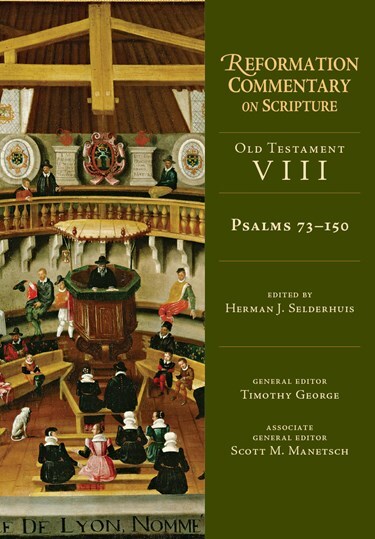
"I lift up my eyes to the hills.
From where does my help come?
My help comes from the Lord,
who made heaven and earth." (Ps. 121:1-2)
Throughout the history of the church, Christians have often turned to the Book of Psalms in both rejoicing and suffering as a significant resource for Christian belief and practice, and as the church's prayer book and hymnal. The Protestant reformers also turned to the Psalms during their time of significant spiritual renewal, theological debate, and ecclesial reform.
There they found comfort, guidance, and wisdom from God that applied to their context as much as it did to David's. As John Calvin explained, "The Holy Spirit has presented in a living image all the griefs, sorrows, fears, doubts, hopes, cares, perplexities, in short, all the emotions with which human minds are often disturbed." And as Martin Luther proclaimed, the reformers also heard a resounding affirmation of the good news of Jesus Christ: "The Psalter ought to be a precious and beloved book because it promises Christ's death and resurrection so clearly."
In this volume, Herman Selderhuis guides readers through the diversity of Reformation-era commentary on the second half of the Psalter. Represented herein are well-known voices as well as lesser-known figures from a variety of theological traditions, including Lutherans, Reformed, Radicals, Anglicans, and Roman Catholics, many of whose comments appear for the first time in English. By making available a variety of resources—including commentaries, sermons, treatises, and confessions—this volume enables scholars to better understand the depth and breadth of Reformation commentary, provides resources for contemporary preachers, and offers keen insights to all who trust that their help comes from the Lord.
The Reformation Commentary on Scripture Series
The Reformation Commentary on Scripture (RCS) provides a crucial link between the contemporary church and the great cloud of witnesses that is the historical church. The biblical insights and rhetorical power of the tradition of the Reformation are here made available as a powerful tool for the church of the twenty-first century. Like never before, believers can feel they are a part of a genuine tradition of renewal as they faithfully approach the Scriptures.
In each RCS volume you will find the biblical text in English, from the English Standard Version (ESV), alongside the insights of the leaders of the Reformation. Hear from landmark figures such as Luther and Calvin, as well as lesser-known commentators such as Peter Martyr Vermigli, Johannes Oecolampadius, Martin Bucer, Johannes Brenz, Caspar Cruciger, Giovanni Diodati, and Kaspar Olevianus. The series introduces you to the great diversity that constituted the Reformation, with commentary from Lutheran, Reformed, Anglican, Anabaptist and even reform-minded Catholic thinkers, who all shared a commitment to the faithful exposition of Scripture.
Each volume is designed to facilitate a rich research experience for preachers and teachers, and contains a unique introduction written by the volume editor, providing a reliable guide to the history of the period, the unique reception of the canon of Scripture and an orientation to the thinkers featured in the volume. Many of these texts are being published in English for the first time, and volumes also contain biographies of figures from the Reformation era, adding an essential reference for students of church history.
Herman J. Selderhuis is professor of church history and church polity at the Theological University Apeldoorn (Netherlands) and director of Refo500, the international platform for knowledge, expertise, and ideas related to the sixteenth-century Reformation. He is a leading Reformation historian and author or editor of several books, including John Calvin: A Pilgrim's Life, Calvin's Theology of the Psalms, and Psalms 1-72 in the Reformation Commentary on Scripture. He also serves as the academic curator of the John a Lasco Library (Emden, Germany) and as president of the International Calvin Congress.
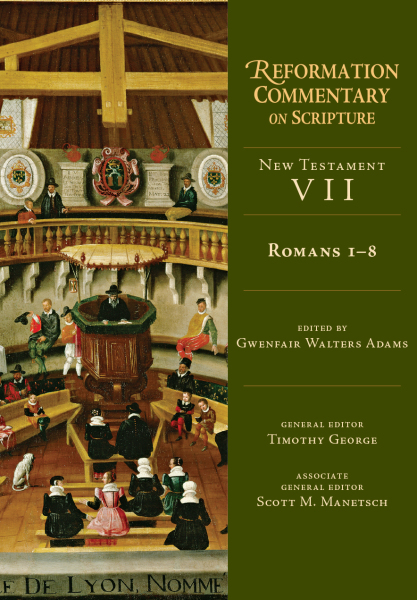
"If we have been united with him in a death like his, we shall certainly be united with him in a resurrection like his." (Rom. 6:5)
With its themes of grace, sin, justification, and salvation through Christ alone, Paul's letter to the early church in Rome has been a primary focus of Christian reflection throughout church history. Sixteenth-century reformer Martin Luther reflected the church's longstanding emphasis on this portion of the canon: "This letter is truly the most important piece in the New Testament. It is purest Gospel. . . . It is impossible to read or to meditate on this letter too much or too well. The more one deals with it, the more precious it becomes and the better it tastes."
In this volume of the Reformation Commentary on Scripture, church historian Gwenfair Adams guides readers through a diversity of early modern commentary on the first eight chapters of Paul's epistle to the Romans. Readers will hear from familiar voices as well as discover lesser-known figures, from a variety of theological traditions including Lutherans, Reformed, Radicals, Anglicans, and Roman Catholics. Drawing upon a wide range of resources—including commentaries, sermons, treatises, and confessions—much of which appears here for the first time in English, this volume provides resources for contemporary preachers, enables scholars to better understand the depth and breadth of Reformation commentary, and seeks to help all those who desire to be united with Christ.
The Reformation Commentary on Scripture Series
The Reformation Commentary on Scripture (RCS) provides a crucial link between the contemporary church and the great cloud of witnesses that is the historical church. The biblical insights and rhetorical power of the tradition of the Reformation are here made available as a powerful tool for the church of the twenty-first century. Like never before, believers can feel they are a part of a genuine tradition of renewal as they faithfully approach the Scriptures.
In each RCS volume you will find the biblical text in English, from the English Standard Version (ESV), alongside the insights of the leaders of the Reformation. Hear from landmark figures such as Luther and Calvin, as well as lesser-known commentators such as Peter Martyr Vermigli, Johannes Oecolampadius, Martin Bucer, Johannes Brenz, Caspar Cruciger, Giovanni Diodati, and Kaspar Olevianus. The series introduces you to the great diversity that constituted the Reformation, with commentary from Lutheran, Reformed, Anglican, Anabaptist and even reform-minded Catholic thinkers, who all shared a commitment to the faithful exposition of Scripture.
Each volume is designed to facilitate a rich research experience for preachers and teachers, and contains a unique introduction written by the volume editor, providing a reliable guide to the history of the period, the unique reception of the canon of Scripture and an orientation to the thinkers featured in the volume. Many of these texts are being published in English for the first time, and volumes also contain biographies of figures from the Reformation era, adding an essential reference for students of church history.
Gwenfair Walters Adams (PhD, Cambridge) is associate professor of church history at Gordon-Conwell Theological Seminary. She is the author of Visions in Late Medieval England: Lay Spirituality and Sacred Glimpses of the Hidden Worlds of Faith.
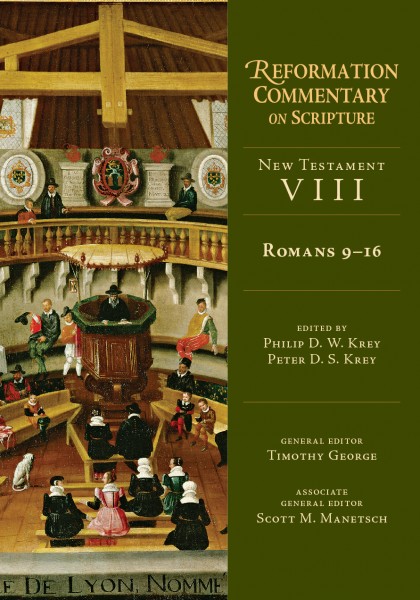
Writing to the early Christians in Rome, the apostle Paul said, "Do not be conformed to this world, but be transformed by the renewal of your mind, that by testing you may discern what is the will of God, what is good and acceptable and perfect" (Rom 12:2 ESV).
Perhaps more than any other New Testament epistle, Paul's letter to the Romans has been the focus of Christian reflection throughout the church's history, transforming the minds and convicting the hearts of believers. Sixteenth-century reformer Martin Luther reflected the church's longstanding emphasis on this portion of the canon: "Let the Epistle to the Romans be the door and the key to holy Scripture for you; otherwise you will never enter into a proper understanding and comprehension of the Bible."
In this volume of the Reformation Commentary on Scripture, Philip Krey and Peter Krey guide readers with care through a diversity of Reformation-era commentary on the second half of Paul's letter to the Roman church. Among the difficult issues addressed by Paul and commented on by early modern exegetes were the predestination of God's elect, the destiny of Israel, the role of Gentiles in salvation history, the ethical demands of the Christian life, and the Christian's relationship to the state.
Here, readers will encounter familiar voices and discover lesser-known figures from a variety of theological traditions, including Lutherans, Reformed, Radicals, Anglicans, and Roman Catholics. The volume draws on a variety of resources, including commentaries, sermons, treatises, and confessions, much of which appears here for the first time in English. Gathering together these Reformation-era reflections, it provides resources for contemporary preachers, enables scholars to better understand the depth and breadth of Reformation biblical commentary and aids the ongoing transformation of the minds—and lives—of people today.
The Reformation Commentary on Scripture Series
The Reformation Commentary on Scripture (RCS) provides a crucial link between the contemporary church and the great cloud of witnesses that is the historical church. The biblical insights and rhetorical power of the tradition of the Reformation are here made available as a powerful tool for the church of the twenty-first century. Like never before, believers can feel they are a part of a genuine tradition of renewal as they faithfully approach the Scriptures.
In each RCS volume you will find the biblical text in English, from the English Standard Version (ESV), alongside the insights of the leaders of the Reformation. Hear from landmark figures such as Luther and Calvin, as well as lesser-known commentators such as Peter Martyr Vermigli, Johannes Oecolampadius, Martin Bucer, Johannes Brenz, Caspar Cruciger, Giovanni Diodati, and Kaspar Olevianus. The series introduces you to the great diversity that constituted the Reformation, with commentary from Lutheran, Reformed, Anglican, Anabaptist and even reform-minded Catholic thinkers, who all shared a commitment to the faithful exposition of Scripture.
Each volume is designed to facilitate a rich research experience for preachers and teachers, and contains a unique introduction written by the volume editor, providing a reliable guide to the history of the period, the unique reception of the canon of Scripture and an orientation to the thinkers featured in the volume. Many of these texts are being published in English for the first time, and volumes also contain biographies of figures from the Reformation era, adding an essential reference for students of church history.






- Adapt your commentary collection month-to-month based on the book or books you are studying.
- Build your commentary library strategically without hundreds of dollars of upfront investment.
- Never get stuck with commentaries you rarely use - swap them out each month as your needs change.



